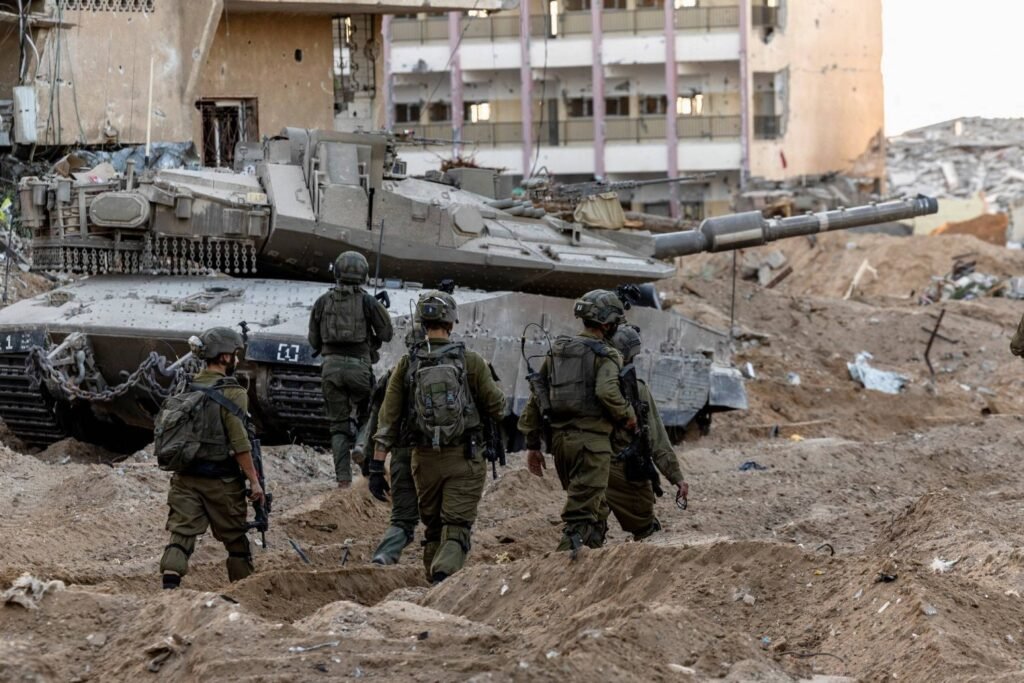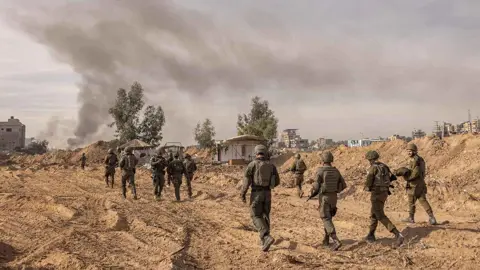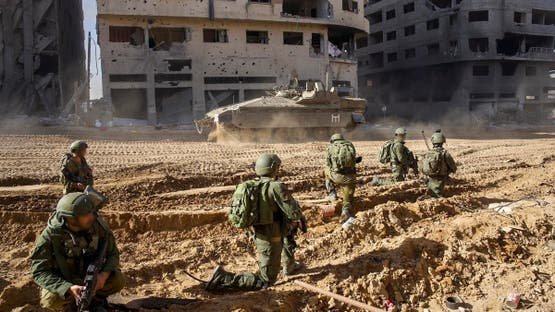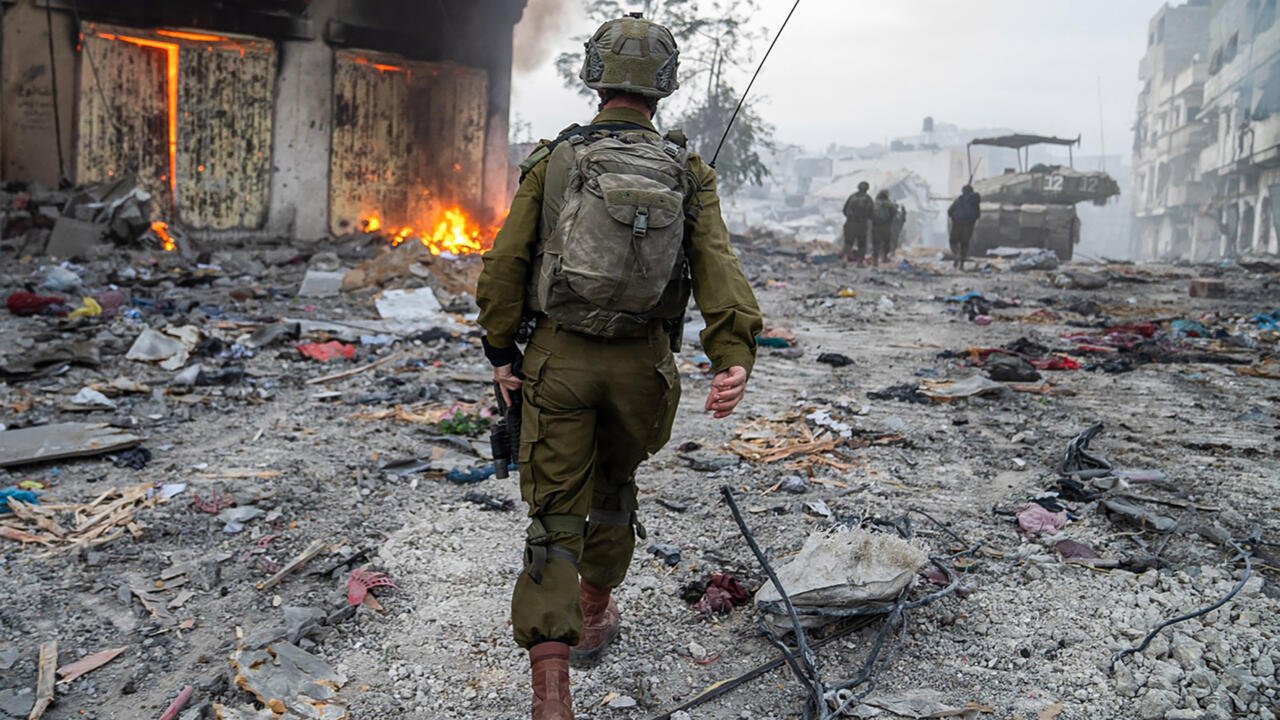
The film Breaking Ranks: Inside Israel’s War, broadcast by the British newspaper The Guardian, is far more than a passing documentary. It stands as a collective testimony of moral and human collapse within the Israeli army. In this film, soldiers and officers who served in Gaza during the war share shocking accounts of what they saw and did, exposing that what took place was not simply a “battle” but a systematic genocide targeting every aspect of Palestinian life.
The film and its accompanying report present direct testimonies from within the Israeli military institution itself. They reveal how values vanished, how religious and political discourse turned into an open license to kill, and how the concept of “the enemy” was redefined to include every Palestinian living in the besieged Strip.
Commander Daniel: “If you want to shoot without limits, you can”The film begins with the testimony of Commander Daniel, an officer who led a tank unit in Gaza.
He says:“If you want to shoot without limits, you can.”
“A human shield is sent into the tunnel. As he walks, he maps it using an iPhone in his vest, which sends the data through GPS. The commanders saw how this method worked, and it spread quickly. After about a week, every battalion began applying its own version.”
“I feel they destroyed all my pride in being an Israeli, in being an officer in the Israeli Defense Forces. All that remains is shame.”
“You always hear that there are no innocents in Gaza, and you start to believe it.”
These statements summarize what statistics cannot express. They testify to a total collapse of military conscience and a field policy that permits killing without accountability. The phrase “If you want to shoot without limits” reveals that orders were unrestricted and that the distinction between civilians and fighters was completely erased.
The use of “human shields” represents a direct violation of international humanitarian law and proves that Palestinian civilians were deliberately put in harm’s way to protect soldiers.
Daniel’s admission that his commanders spread this practice until it became “a standard method” exposes the institutional nature of these crimes. They were not random acts of misconduct but a deliberate and systematic approach to warfare.
From Daniel’s Testimony to Another Voice: Captain Yotam Filk and the Disappearance of Rules of Engagement

After Daniel lays the foundation for how military morality disintegrated, we hear from Captain Yotam Filk, an officer in the Armored Corps, who confirms the same reality. He says:
“In basic training we all used to repeat the phrase ‘means, intention, and capability.’”
“There is no concept of ‘means, intention, and capability’ in Gaza. No soldier ever mentioned those terms. It was simply suspicion of walking in a forbidden area. A man between the ages of twenty and forty.”
Here, the logic of the army itself turns into a blind killing machine. Simple suspicion becomes a reason to shoot. There is no longer a need for intent, evidence, or threat. Age and geography become sufficient justification for death.
Filk’s testimony shows that killing was not the result of battle but of a predetermined classification of every Palestinian as a permanent target. It reflects a policy of extermination based on identity, no different in essence from the acts of ethnic cleansing recorded throughout modern history.
From Military Discipline to Moral Chaos: The Testimony of Soldier Eli
The film then moves to the testimony of a soldier identified as Eli, who gives a detailed account of the moral collapse on the ground. He says:
“Life and death are not determined by procedure or rules of engagement. The conscience of the field commander decides.”
“If they walk too fast, they are suspicious. If they walk too slow, they are suspicious. They must be planning something. If three men walk and one lags behind, that is a two to one military formation.”
“I saw a senior officer ordering a tank to destroy a building in a civilian area. A man was standing on the roof hanging laundry, and the officer decided he was a lookout. But he was not; he was just hanging his clothes. You could see it clearly. He had no binoculars, no weapon, and the nearest military unit was six or seven hundred meters away. The tank fired a shell, half the building collapsed, and many people were killed and injured.”
Eli’s words reveal that death in Gaza was often the result of a personal decision, driven by fear and hatred rather than danger. The scene he describes of the man hanging his laundry proves that civilians were killed deliberately, even when their innocence was clear.
Such an act cannot be excused as a battlefield error. It is a conscious choice to kill, which under the Geneva Conventions qualifies as a war crime.
Religious Incitement and Blind Revenge: The Testimony of Major Neta Caspin

After the field accounts, Major Neta Caspin exposes how religious ideology fueled the violence. He says:
“The brigade rabbi sat next to me and spent half an hour explaining why we must be like them on October 7, why we must take revenge on all of them, including civilians, and make no distinction between them, because that is the only way.”
This statement clearly reveals the ideological dimension of the war, where military action was transformed into collective revenge against civilians. The brigade rabbi, who should represent a moral voice, instead promotes the killing of civilians, implicating the religious establishment directly in the making of genocide.
Caspin’s testimony explains how killing was “sanctified” and turned into a religious duty, which helps explain the excessive brutality that international observers and human rights organizations have documented.
From Incitement to the Field: The Testimony of Soldier Sam
Next comes the testimony of a soldier identified as Sam, a civilian contractor who worked at aid distribution sites inside Gaza. He says:
“I saw two soldiers running after two young men who were running with the crowd to get aid. The soldiers knelt, fired two shots, and I saw the heads of the young men snap back as they fell to the ground.”
“In another incident, a tank destroyed a regular civilian car with four completely ordinary people inside.”
This account, coming from an insider, shows that the deliberate targeting of civilians seeking food was not an accident but a systematic practice. Shooting people as they ran toward aid distributions demonstrates an intent to starve and terrorize the population, which is a hallmark of genocidal warfare aimed at breaking the will of civilian life.
Sam’s testimony goes beyond a violation of humanitarian law. It exposes a policy of annihilation where every Palestinian movement inside Gaza—even the act of seeking food—was treated as a punishable offense.
Genocide Justified by Faith: The Testimony of Rabbi Avraham Zarbiav
The film concludes with the words of Rabbi Avraham Zarbiav, who served for more than five hundred days in Gaza and was one of the most visible religious figures within the army.
He says: “Everything there is one big terrorist infrastructure.”
“The Israeli army invested hundreds of thousands of shekels to destroy the Gaza Strip. We changed the behavior of an entire army.”
He also admits that he personally operated military bulldozers to demolish Palestinian neighborhoods and considered it a sacred religious act.
His statements encapsulate the mindset behind the war: the total dehumanization of Palestinians and the framing of Gaza as a single legitimate target. When he says “everything there is a terrorist infrastructure,” he denies the existence of civilians altogether. This reasoning lies at the core of every genocide ever recorded in human history.
Connecting the Testimonies: One Continuous Crime

From Daniel’s description of free fire zones, to Caspin’s account of religious incitement, to Sam’s witness of civilian executions and Zarbiav’s religious justification, a single picture emerges—a picture of organized genocide.
Each testimony confirms the others and completes the pattern:
- There were open orders to shoot.
- There was ideological justification to kill.
- There was systematic execution on the ground.
And the outcome was the same: tens of thousands of civilians killed, many of them women and children.This was not a war between two armies but a deliberate campaign of extermination against a trapped civilian population.
The Numbers That Speak Beyond Words
According to The Guardian, more than 83 percent of the victims in Gaza were civilians. Over sixty nine thousand Palestinians have been killed since the beginning of the war, including thousands who died while trying to reach humanitarian aid.
When these numbers are placed beside the soldiers’ testimonies, they reveal that what occurred was not a failure of judgment but a deliberate policy of annihilation.
The repetition of phrases such as “there are no innocents in Gaza” across multiple testimonies proves that this mindset was not individual opinion but institutional doctrine deeply embedded within the army’s culture.
These admissions therefore are not acts of absolution. They are legal and moral evidence of war crimes and crimes against humanity.
Conclusion
The film Breaking Ranks: Inside Israel’s War has broken a long silence. For the first time, Israeli soldiers themselves have confessed publicly to the nature of the war they fought. Their words are not just descriptions of violence—they are acknowledgment from within the system that what took place in Gaza was an organized campaign of extermination, driven by military orders, religious incitement, and political justification.
This film, with all the voices and testimonies it contains, is more than journalism. It is a document of indictment against a history of systematic violence toward Palestinians. The conscience that collapsed in the field has begun to speak before the camera, declaring to the world that what happened in Gaza was not a war on terrorism, but a war on human existence itself.
Source: The Guardian & International Outlets

